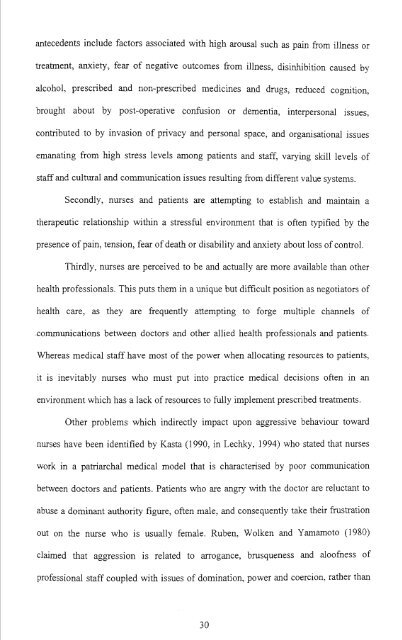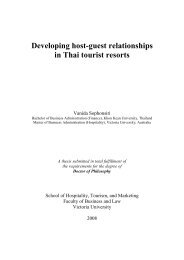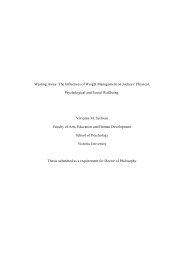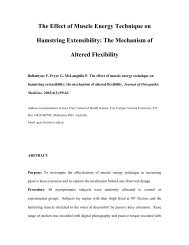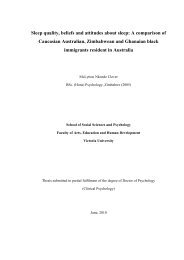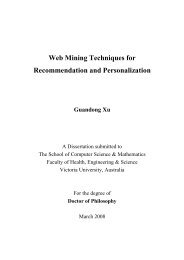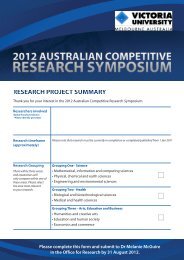- Page 3 and 4: NURSES' RESPONSES TO WORK-RELATED A
- Page 5 and 6: ABSTRACT The mcidence of work-relat
- Page 7 and 8: ACKNOWLEDGMENTS I am very grateful
- Page 9 and 10: 2.4 Incidence of aggressive behavio
- Page 11 and 12: 7.2.1.4 Measuring perceived profess
- Page 13 and 14: CHAPTER 10: FINDINGS OF THE EVDEPTH
- Page 15 and 16: LIST OF TABLES Table 1 Major dimens
- Page 17 and 18: Appendix A Appendix B Appendix C Ap
- Page 19 and 20: Chapman, & Fisher, 1995). Increasin
- Page 21 and 22: (1993) have conceptualised competen
- Page 23 and 24: This decision would be predicated u
- Page 25 and 26: The effectiveness of organisations
- Page 27 and 28: 1.5.1 Evolutionary and psychologica
- Page 29 and 30: 1.5.3 Behavioural perspectives on a
- Page 31 and 32: 1.6 Rationale for the present inves
- Page 33 and 34: Figure 1 Organisation of the thesis
- Page 35 and 36: CHAPTER TWO NURSES' EXPERIENCES OF
- Page 37 and 38: 2.3.1 A range of definitions The me
- Page 39 and 40: Examination of the literature shows
- Page 41 and 42: Among other writers, Flemmg (1987:1
- Page 43 and 44: ...the application of force, seriou
- Page 45: ascertain the scope of the problem
- Page 49 and 50: e likely to be on the receiving end
- Page 51 and 52: violence is U.S. $4.3 billion annua
- Page 53 and 54: 2.7.1 Types of aggression Aggressio
- Page 55 and 56: communication through words, tone,
- Page 57 and 58: often a medical doctor. In Britain,
- Page 59 and 60: professional status and unage. Freq
- Page 61 and 62: noted two major patterns. Firstly t
- Page 63 and 64: Tapsell (1990, in Lechky, 1994:739)
- Page 65 and 66: Mason and Chandley (1999) observed
- Page 67 and 68: 1984). Many of the changes outiined
- Page 69 and 70: workers, cynicism to patients, low
- Page 71 and 72: CHAPTER THREE REPORTING AGGRESSION:
- Page 73 and 74: Levy and Hortocollis (1976) provide
- Page 75 and 76: where support combme with other fac
- Page 77 and 78: (20 out of 22 sttidies) had found e
- Page 79 and 80: support. Thus although there may fr
- Page 81 and 82: "especially from one's supervisor,
- Page 83 and 84: eceive support at all, rather than
- Page 85 and 86: eporting futtue incidents. Fear of
- Page 87 and 88: to which nurses must aspire. All cl
- Page 89 and 90: measurements. In other words, compe
- Page 91 and 92: [containmg] those competencies esse
- Page 93 and 94: available resources. Hence, there i
- Page 95 and 96: demand originating within or withou
- Page 97 and 98:
If the encounter seems to have no r
- Page 99 and 100:
subjective job-related competence d
- Page 101 and 102:
account die context m which coping
- Page 103 and 104:
elevant to the solution. Problem-fo
- Page 105 and 106:
level of violence was threatening e
- Page 107 and 108:
Lazaras and Folkman (1984) describe
- Page 109 and 110:
The social environment, tiien, thro
- Page 111 and 112:
as well as being underbenefited in
- Page 113 and 114:
aggression, institutional social su
- Page 115 and 116:
hypothesis, that institutional soci
- Page 117 and 118:
CHAPTER FTVE CONCEPTUALISATION OF T
- Page 119 and 120:
professional and emotional reaction
- Page 121 and 122:
5,6 Expected outcomes of the invest
- Page 123 and 124:
actual staging of an assault situat
- Page 125 and 126:
First, appraisal is a private, subj
- Page 127 and 128:
social support from significant oth
- Page 129 and 130:
6.4 Phenomenology as a philosophy a
- Page 131 and 132:
Phenomenology features several cent
- Page 133 and 134:
experience the worid basically m th
- Page 135 and 136:
CHAPTER SEVEN PHASE FOUR: METHODOLO
- Page 137 and 138:
may result in a failure to identify
- Page 139 and 140:
are described accordmg to how the r
- Page 141 and 142:
aggression. Talkmg and listening to
- Page 143 and 144:
principal and associate supervisor,
- Page 145 and 146:
All 18 questions on supportmg behav
- Page 147 and 148:
The first component, which could be
- Page 149 and 150:
was relatively simple. Responses to
- Page 151 and 152:
A total of 31 participants complete
- Page 153 and 154:
nurses (N= 50,413) held by the Vict
- Page 155 and 156:
Firstiy, nurses are a mobile occupa
- Page 157 and 158:
CHAPTER EIGHT PHASE FIVE: METHODOLO
- Page 159 and 160:
An important pomt in the context of
- Page 161 and 162:
ability to bracket facilitates tiio
- Page 163 and 164:
eported, approval of the interview
- Page 165 and 166:
interviewed participant could be in
- Page 167 and 168:
8.5.2 Human analysis of qualitative
- Page 169 and 170:
applied to a segment of words in or
- Page 171 and 172:
CHAPTER NINE PHASE SIX: RESULTS OF
- Page 173 and 174:
9.3 Identification of frequency, ty
- Page 175 and 176:
esponses (707) were in the category
- Page 177 and 178:
aggression, with 28 responses (4.3%
- Page 179 and 180:
(5.1%) of sample made 35 responses
- Page 181 and 182:
Thirty four participants (12.4%) of
- Page 183 and 184:
categories were collapsed into two
- Page 185 and 186:
patients. This variable was also co
- Page 187 and 188:
Thus die hypothesis that work-relat
- Page 189 and 190:
aggression on all components and ag
- Page 191 and 192:
1 The first equation regressed the
- Page 193 and 194:
Competence 18-] 1 16- 1 g 14- 12- 1
- Page 195 and 196:
esponses to tiie incidents recorded
- Page 197 and 198:
professional competence. Aggressive
- Page 199 and 200:
9.1 Institutional deficit factor In
- Page 201 and 202:
occasions from female staff, made m
- Page 203 and 204:
Tangible support was listed m the f
- Page 205 and 206:
The follovmig comment also demonstt
- Page 207 and 208:
CHAPTER 10 RESULTS OF PHASE FIVE: Q
- Page 209 and 210:
The sample mcluded ten nurses who h
- Page 211 and 212:
The nine typical incidents are as f
- Page 213 and 214:
Huberman's (1994) model of data pre
- Page 215 and 216:
I felt I was in danger and it was n
- Page 217 and 218:
Narratives from Yvonne, Jun, Mary,
- Page 219 and 220:
Louise also made the following comm
- Page 221 and 222:
Illustration 2: Participant I Saman
- Page 223 and 224:
nurse due to her expected role of c
- Page 225 and 226:
Illustration 2: Participant 25 Decl
- Page 227 and 228:
Illustration 5: Participant 33 Like
- Page 229 and 230:
Table 17 Data display matrix for do
- Page 231 and 232:
emotions from nurses as they stt^gg
- Page 233 and 234:
was a more severe form of aggressio
- Page 235 and 236:
feel twelve months or more followin
- Page 237 and 238:
The tiurd aim was to develop and ev
- Page 239 and 240:
hospitals is not as conttolled as i
- Page 241 and 242:
well as key variables of reportmg b
- Page 243 and 244:
The current study addressed these m
- Page 245 and 246:
impact upon nurses. The concept of
- Page 247 and 248:
Victims of sexual aggression report
- Page 249 and 250:
under estimation of the problem and
- Page 251 and 252:
constructively release and deal wit
- Page 253 and 254:
support from Pennebaker, Colder and
- Page 255 and 256:
variables diat may help to explain
- Page 257 and 258:
elated aggression described mcident
- Page 259 and 260:
11.6.2 Theme 2: Expectation to cope
- Page 261 and 262:
Williams, 1991). Researchers have f
- Page 263 and 264:
communication nurses describe as al
- Page 265 and 266:
to assist widi tiie management of a
- Page 267 and 268:
own activities of daily livuig, to
- Page 269 and 270:
senior staff appeared to be linked
- Page 271 and 272:
support was provided, nurses confir
- Page 273 and 274:
curtaihnent of freedom because of p
- Page 275 and 276:
Nurses must be educated tiirough in
- Page 277 and 278:
should specifically consider the re
- Page 279 and 280:
encouragmg and promoting profession
- Page 281 and 282:
Given that nurses already are engag
- Page 283 and 284:
REFERENCES 266
- Page 285 and 286:
Bandura, A. (1977). Self-efficacy:
- Page 287 and 288:
Braitiiwaite, R. (1992). Violence:
- Page 289 and 290:
Clark, M.S., & Mills, J. (1979). In
- Page 291 and 292:
Donaldson, S. I. (1993). Effects of
- Page 293 and 294:
Folkman, S. (1984). Personal contto
- Page 295 and 296:
Harvey, E., & Bums, J. (1994). Staf
- Page 297 and 298:
Jahoda, M. (1958). Current concepts
- Page 299 and 300:
Lanza, M. L. (1984b). Factors relev
- Page 301 and 302:
Lorenz, K. (1966). On aggression. L
- Page 303 and 304:
Moos, R. H., & Billuigs, A. G. (198
- Page 305 and 306:
Poster, E. C, & Ryan, J. (1994). A
- Page 307 and 308:
Schaffer, D. (1979). Social and per
- Page 309 and 310:
Tesch, R. (1990) Qualitative resear
- Page 311 and 312:
Whittington, R. (1997). Violence to
- Page 313 and 314:
APPENDIX A PILOT QUESTIONNAIRE AND
- Page 315 and 316:
What is your age? Please tick the a
- Page 317 and 318:
SECTION 2; AGGRESSTVE BEHAVIOUR FRO
- Page 319 and 320:
SECTION 4 : REPORTING INCIDENTS OF
- Page 321 and 322:
SECTION 6: PERCEIVED CHANGES TO PRO
- Page 323 and 324:
Sections 1,2 and 3: Aggressive beha
- Page 325 and 326:
How long did it take you to complet
- Page 327 and 328:
What is your age? Please tick the a
- Page 329 and 330:
SECTION 2; AGGRESSTS^ BEHAVIOUR FRO
- Page 331 and 332:
SECTION 4 : REPORTING INCmENTS OF A
- Page 333 and 334:
SECTION 6: PERCEIVED CHAlvr^KS TO P
- Page 335 and 336:
APPENDIX D LETTER OF INTRODUCTION T
- Page 337 and 338:
If you choose to participate, pleas
- Page 339 and 340:
Mr. Cecil Deans 120 Rathkeale Avenu
- Page 341 and 342:
Where your responses to aggressive
- Page 343 and 344:
APPENDIX F CONSENT FOR INTERVIEW SC
- Page 345 and 346:
APPENDIX G PARTICIPANT CONTACT SUMM
- Page 347 and 348:
APPENDIX H TABLES SHOWING SUPPORTIN


